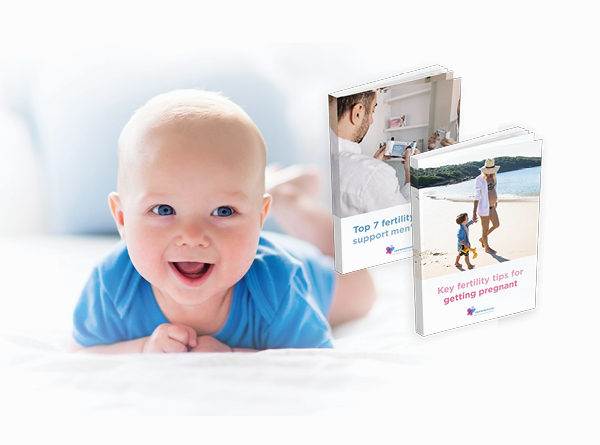Usually when you read tips to prepare for conception and pregnancy, the advice is directed at women. But, as the saying goes - it takes two to tango! Male fertility health is an absolutely essential consideration during the conception process. So, gents - here are some tips to promote healthy sperm and increase chances of a healthy, natural conception.
The stats about male fertility
Couples are often surprised to hear that in approximately 40 percent of cases where couples have trouble conceiving, it is due to male infertility. There are several lifestyle and environmental factors that can affect male fertility, but, according to Sydney fertility specialist Dr Raewyn Teirney, the biggest factor is the actually quality and count of the sperm produced.
- A healthy ejaculation contains around 39−60 million sperm. If a man isn’t producing enough sperm, the chance of conception may be significantly reduced.
- A healthy sperm has an oval head and a long tail. A sperm with abnormalities, such as a curled tail, is less likely to fertilise an egg. The sperm also has to move in a forward progressive movement, and be capable of swimming through the cervix to the egg the fallopian tube.
- Sometimes, sperm face an obstruction that prevents them from leaving the male reproductive system. An obstruction could be due the absence or blockage in the vas deferens (the tube that takes sperm from the testes to ejeculation), or there may be an erectile problem.
Ways to increase male fertility
There are many ways in which a man can improve his sperm health. Here are some key recommendations to increase male fertility.
-
- Maintain a healthy Body Mass Index (BMI)
Being overweight can cause hormone disruption and therefore affect sperm quality. Maintaining a healthy BMI range between 18.5 and 24.9 is ideal for overall wellbeing and fertility.
- Maintain a healthy Body Mass Index (BMI)
- Avoid excess alcohol
The National Health and Medical Research Council (NHMRC) recommends that men trying to conceive drink no more than five standard drinks per week, with at least two alcohol-free days per week. Because is still unclear as to how much alcohol can affect male fertility, avoiding alcohol altogether when trying to conceive is the safest option.
- Don’t smoke or take recreational drugs
Tobacco and drugs can impair sex drive and adversely affect the production of healthy sperm. Harmful constituents found in tobacco such as cadmium, nicotine, lead and radioactive elements may be directly toxic to sperm and sperm DNA. If you need assistance to quit smoking, your family doctor will be able to help you with a cessation plan.
- Double-check your prescription medications - and get an overall health check
If you are currently taking any prescription medication it is possible that some of the chemicals in them can affect the health of sperm. The best option is to check with your family doctor. It’s also a good chance to address any health concerns you may have so that you can ensure you’re in the best shape possible when you and your partner are trying to conceive.
- Avoid excess heat
Warm temperatures may affect the ability of the testes to produce competent sperm, therefore avoid exposure to excess heat, such as spas, saunas and hot baths.
- Eat healthy
A well-balanced diet provides the body with all the essential vitamins and minerals it needs to encourage healthy sperm production. Studies have found that an antioxidant-rich diet can improve sperm numbers and sperm quality. Antioxidants are found in many foods such as citrus fruit, tomatoes, peppers, green vegetables like spinach, kale, broccoli, and nuts and seeds.
- Take a vitamin supplement
Think pre-pregnancy multivitamins are for women only? Think again! It’s just as important for men to boost their levels of vitamins such as C and E as well as selenium, zinc and garlic, which all support male fertility and healthy sperm. Our conceiveplease™ SpermPlus for Men Only Vitamins are specially formulated to provide the boost you need.
- Get regular exercise
Exercise goes hand-in-hand with a well-balanced diet for optimum health. Not only will it help with general wellbeing, help lose any needed weight, reduce stress and perhaps improve sex drive.
- Ejaculate regularly
If you and your partner are planning for a baby, it can’t hurt to get as much practice in as possible! Regular ejaculation helps improve sperm quality. The theory is that sperm are less likely to be 'waiting' and therefore less likely to be attacked by free radicals.
- Get a fertility test
A male fertility test involves assessing a sample of semen to determine sperm count and quality. A specialist will also be able to evaluate your male fertility age based on environment and lifestyle factors. The ageing process can affect fertility in men, though not as dramatically as it can affect women.
Sources:
- Sharma R, Beidenham KR et al. Lifestyle Factors and Reproductive health: taking control of your fertility. Reproductive Biology and Endocrinology 2013, 11:66
- 2. Jensen TK, Andersson AM, Jorgensen N et al. Body mass index in relation to semen quality and reproductive hormones among 1,558 Danish men. Fertil Steril 2004, 82;863-870
- Sallmen M, Sandler DP et al. Reduced Fertility in Obese Men. Epidemiology 2006, 17:520-523
- Mendiola J, Torres-Canteo AM et al. A low intake of antioxidant nutrients is associated with poor semen quality in patients attending fertility clinics. Fertil Steril 2010, 93:1128-1133.
- Silver EEW. Effect of antioxidant intake on sperm chromatin stability in healthy non smoking men. J Androl 2005, 26:550-1336
- Wogatzky J, Wirleitner B et al. The combination matters- distinct impact of lifestyle factors on sperm quality: a study on semen analysis of 1683 patients according to MSOME criteria. Reproductive Biology and Endocrinology 2012, 10:115-
- M. Blomberg Jensen et al. Vitamin D is positively associated with sperm motility and increases intracellular calcium in human spermatozoa. Human Reproduction 2011, 26 (6): 1307-1317
- Lerchbaun E, Obermay-Pietsh B. Vitamin D and Fertility: a systematic review. European Journal of Endocrinology.
- Showell MG, Brown J et al. Anti-oxidants for male subfertility. Cochrane Database Syst Rev 2011 Jan 19 (1)
Your pregnancy journey
Preparing for pregnancy
A good preconception plan to educate yourself about your fertility cycle and implementing recommended lifestyle changes optimises your chances of conceiving naturally.
Monitoring ovulation
In order to pinpoint your fertile window, you need to be aware of the length of your menstrual cycle. The average length of menstruation is 28 days.
During pregnancy
The female body will evolve dramatically within this time and there are many nutritional and lifestyle changes that will be necessary to meet the needs of a growing healthy foetus.
Download your FREE e-books for top fertility tips to help you get pregnant





